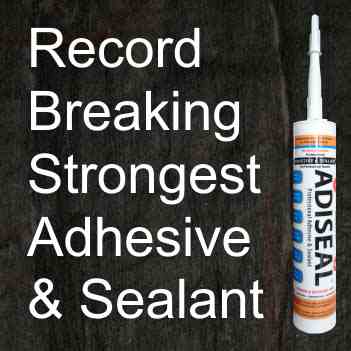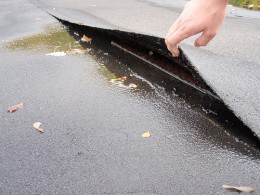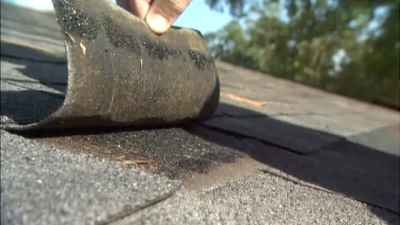Repair a Felt Roof
How to REPAIR a FELT ROOF | Step by Step Guide
When a felt roof is damaged, timely repairs are essential to prevent leaks and prolong its lifespan. Repairing a felt roof involves identifying the damage, preparing the surface, applying new roofing felt with suitable adhesive or sealing it with a felt roof sealant. Proper repair techniques restore the roof’s integrity and protect it from the elements. Regular maintenance and inspections are crucial for early detection of issues and preventing additional damage. Our guide offers step-by-step instructions to effectively repair a felt roof, ensuring a watertight and durable roofing system.
Reasons why felt roof is leaking
Felt roofs can develop leaks due to various reasons. Here are some common causes of felt roof leaks:
- Age and Wear: Over time, the felt material on the roof can deteriorate due to exposure to weather elements, leading to cracks, tears, or thinning areas that allow water to penetrate.
- Poor Installation: If the felt roof was not properly installed, with inadequate overlaps, secure fixings, or improper sealing, it can create vulnerable areas where water can seep through.
- Ponding Water: Flat or low-pitched felt roofs may experience ponding water, where water accumulates and doesn’t drain properly. This constant pooling of water can lead to the breakdown of the felt material and eventual leaks.
- Damage from Debris: Falling branches, tree limbs, or other debris can puncture or damage the felt roof, creating openings for water to enter.
- Shrinkage and Expansion: Felt roofs can expand and contract with temperature fluctuations. Over time, this movement can cause the felt material to shrink, crack, or pull away from the edges, allowing water infiltration.
- Faulty Flashings: Improperly installed or damaged flashings around chimneys, vents, skylights, or other roof penetrations can create points of vulnerability where water can seep in.
- Poor Maintenance: Neglecting regular roof inspections and maintenance can lead to undetected issues such as loose or missing felt, damaged flashing, or deteriorated sealants, which can contribute to leaks.
Identifying the specific cause of the leak is crucial for effective repairs. It is recommended to consult a professional roofer to assess the extent of the damage and provide appropriate solutions for repairing the felt roof and preventing future leaks.
Adhesive for felt roof
Adiseal sealant & adhesive is an excellent solution for repairing a leaking felt roof and roofing felt adhesive. This versatile product offers both emergency repair capabilities and long-lasting sealing properties. It functions as an effective felt adhesive and a reliable felt roof sealant simultaneously. Not only can it stick roofing felt, but it can also seal instantly even in the rain. By using Adiseal, you can quickly address the leak and create a strong, durable seal, ensuring the integrity of your felt roof is restored.

Sealant for roof felt
The reason why Adiseal sealant & adhesive is a great product when used as a roof felt sealant is because Adiseal:
- Works in dry, wet & even underwater
- Seals instantly
- Provides a permanent seal
- Stays permanently flexible
- UV resistant
- Cold applied
- Resists mould growth
- Solvent free
- Strongest adhesive
- Waterproof adhesive
Works in dry, wet & even underwater
Adiseal is a remarkable adhesive and sealant that works effectively in various conditions, including wet and underwater environments. This unique feature allows for emergency repairs to a leaking felt roof, even during rainy weather. With Adiseal, you can confidently address the leak and carry out the necessary repairs, ensuring the protection of your felt roof, regardless of the external conditions.
Adiseal is a muti-purpose product that will also fix a leaking gutter.
Seals instantly
Adiseal’s instant sealing capability provides a convenient way to assess the success of a flat roof leak repair. After completing the repair, you can perform a simple test by pouring water onto the roof. By doing so, you can quickly determine if the repair has effectively resolved the leak, providing immediate feedback on the effectiveness of the Adiseal adhesive. This allows for efficient troubleshooting and ensures that the roof felt is properly repaired.
Provides a permanent seal
By utilizing Adiseal for a felt roof leak repair, you can expect not only an immediate emergency fix but also a long-term and permanent solution. When the felt roof sealant is applied correctly, Adiseal creates a durable and reliable seal that is designed to withstand the test of time. This means that once the repair is completed using Adiseal, you can have confidence that the seal will remain intact for years, providing lasting protection against leaks and ensuring the longevity of your felt roof.
Permanently flexible
Adiseal offers a unique advantage with its permanent flexibility, ensuring it remains resilient and avoids becoming brittle over time. When subjected to temperature fluctuations, objects naturally expand and contract. Unlike inflexible alternatives, Adiseal’s flexible nature allows it to accommodate these movements without cracking or breaking, thereby preventing water from seeping through. As a result, Adiseal serves as a reliable adhesive and sealant that maintains its flexibility, providing long-lasting protection against leaks and ensuring a durable bond.
UV resistant
UV resistance is a crucial factor to consider when selecting a product for roofing applications, as the roof is exposed to significant UV radiation from the sun. If a product lacks UV resistance, it is highly likely to deteriorate rapidly under such conditions. Given the prominent role of roofs in shielding a property, it is essential to choose materials, adhesives, and sealants that possess excellent UV resistance to ensure long-term performance and durability in the face of constant sun exposure.
Cold applied
Repairing a leak on a flat felt roof traditionally involves using a blowtorch, which poses a fire risk and may not be suitable for everyone. However, Adiseal provides a safer alternative as it can be cold applied directly from the cartridge. This eliminates the need for a blowtorch, making the repair process more convenient and reducing the associated fire hazards. With Adiseal, you can confidently and effectively repair the leak on your flat felt roof without the need for potentially dangerous tools.
Solvent free
Adiseal roof felt sealant & adhesive stands out from other products due to its solvent-free formulation, ensuring that it does not shrink once applied. This is a common issue with many other products in the market. Unlike those products that rely on solvents to cure, causing them to shrink and detach from the surface, Adiseal maintains its integrity and provides a strong bond.
In addition, solvent-based adhesive & sealants can pose a problem when used on sensitive materials such as polystyrene, which is commonly used for insulation in roofs, walls, and other areas. The solvents in these products can cause damage to polystyrene and compromise its effectiveness. With Adiseal’s solvent-free formulation, you can confidently use it without the risk of harming sensitive materials like polystyrene.
Strongest Adhesive
Adiseal not only excels as a sealant but also emerged as the strongest adhesive in an independent adhesive strength test conducted by Ultimate Handyman. The results showed that Adiseal outperformed its closest competitor by over three times in terms of strength. For more detailed information on the test, you can refer to the Adiseal page.
How to repair a felt roof
How to repair a flat roof leak
- Safety First
Ensure you have proper safety equipment, such as gloves and sturdy footwear, before starting the repair process.
- Clean the Area
Clear any debris, dirt, or loose materials from the damaged area of the felt roof. Use a stiff brush to clean the surface thoroughly.
- Locate the Damage
Identify the specific area that needs repair. Look for signs of damage, such as cracks, tears, or lifted edges in the felt.
- Prepare the Roofing Felt
Cut a piece of new roofing felt larger than the damaged area. Ensure the replacement piece is of the same type and thickness as the existing felt.
- Apply the Adhesive
Using a brush or roller, apply a layer of bitumen adhesive to the damaged area and the underside of the replacement felt piece. Make sure the adhesive is spread evenly.
- Position the Replacement Felt
Carefully place the replacement felt onto the adhesive-coated area, aligning it properly with the existing felt. Press it down firmly to ensure a secure bond.
- Smooth Out and Seal
Use a soft brush or roller to smooth out any air bubbles or wrinkles in the repaired area. Apply additional adhesive around the edges of the replacement felt to create a watertight seal.
- Allow Time to Cure
Give the adhesive sufficient time to cure and bond the replacement felt securely to the roof surface. Follow the manufacturer’s instructions for the recommended curing time.
- Maintain the Roof
Regularly inspect and maintain your felt roof to prevent further damage. Clear debris, check for loose edges, and consider applying a roof coating or sealant for added protection.

Tip: To store Adiseal once opened, leave about 1cm worth of product out of the nozzle and store the tube upright in a cool dry place. Adiseal requires moisture for it to cure. The exposed part out of the nozzle will cure creating a cap. To re-use Adiseal, pull the cured part out or cut the nozzle until the uncured part is reached.
Repairing cracked felt
If the felt is simply cracked then it may be possible to seal it with Adiseal sealant. Clean the area then simply apply Adiseal over the top of the crack. It is better to start closest then push forward as this will push the sealant into the crack providing a better seal.
Adhesive for felt roof
Adiseal is also a great adhesive for roofing felt as well a being a great sealant for felt roofs.

Adiseal adhesive & sealant is an excellent choice for bonding and sealing roof felt shingles, felt lap, and larger felt sheets. Unlike other adhesives, Adiseal not only provides a strong bond but also offers a reliable waterproof seal. This dual functionality ensures that the roofing felt is securely attached while protecting against moisture penetration. With Adiseal, you can achieve both effective adhesion and durable waterproofing for your roof felt applications.
How to stick roof felt shingles & felt lap
Before sticking roof felt shingles, it is important to ensure that the surface is clean and free from debris. Thoroughly clean the area using Adisolve solvent cleaner, which effectively removes oil, grease, tar, bitumen, and other stubborn deposits. Use a fine brush, such as a painting brush, to eliminate any fine dust from the application area.
Adiseal adhesive & sealant can be applied directly without the need for heat. Apply Adiseal to one surface and firmly press down the roof felt shingle. While Adiseal seals instantly, it may take 24 to 48 hours to fully cure.
Where to buy
In the UK, to buy felt roof sealant or felt roof adhesive please contact us for details of your local stockist. For other countries visit www.guglue.com
Frequently asked questions
Inspect the roof for signs of wear, tears, cracks, or areas where water is seeping through. Look for discolored or damp patches on the ceiling inside the building, as they can indicate the location of the damage.
You may need a utility knife, roofing adhesive, roofing felt, a trowel or brush for applying the adhesive, and a ladder or scaffolding for accessing the roof.
It depends on your level of experience and comfort working at heights. Simple repairs like patching small tears or replacing a section of felt can be done by a competent DIYer. However, for extensive damage or if you’re unsure, it’s best to hire a professional roofer.
Clean the area by removing any loose debris, dirt, or vegetation. Trim away any loose or damaged felt around the repair site. Ensure the surface is dry before proceeding with the repair.
Look for a roofing adhesive specifically designed for felt roofs. It should provide a strong and waterproof bond suitable for repairing and securing the roofing felt.
It’s best to avoid walking on the repaired area until the adhesive has fully dried or cured to prevent any damage or disruption to the repair.
Regularly inspect the roof for any signs of new damage or wear. Keep the roof clear of debris and maintain good drainage to prevent water buildup. Address any issues promptly to avoid further damage or leaks.
